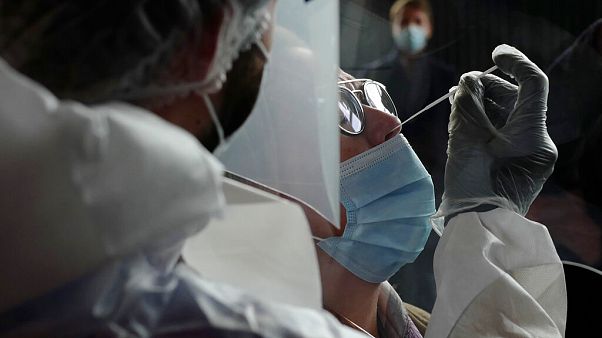COVID-19 Europe round-up: France registers record 30,000 new cases in 24 hours

A woman has a nose swab taken for a COVID-19 test at Lille Zenith Arena in Lille, northern France – Copyright AP Photo
France has announced a record 30,000 new COVID-19 cases in a day.
Prime Minister Jean Castex made the revelation on Twitter, calling on French citizens to understand the seriousness of the situation.
“All of us have, within us, the possibility, by our behaviour, to protect us, to protect others and to slow the circulation of the virus.”
In France, a four-week state of emergency was re-introduced on Wednesday, with Castex revealing the extent of the measures the following afternoon.
From midnight on Saturday, a curfew will come into force in and around Paris, and eight other metropolitan areas.
These include Grenoble, Lille, Lyon, Aix-Marseille, Montpellier, Rouen, St Etienne and Toulouse.
It will affect around 19 million people and comes after the national incidence rate over the past ten days jumped from 107 to 190 cases of COVID-19 per 100,000 people.
Castex said this rate jumped further to “particularly alarming levels” in some larger cities.
It came as records were smashed elsewhere in Europe over the last 24 hours. Several countries registered their highest-ever daily increases of coronavirus cases, and others looked to halt the disease with partial lockdowns.
Soaring cases, new restrictions
Germany, Italy, Poland and the Netherlands were among the nations to set new individual records as they each counted thousands of new infections of COVID-19.
There were 6,638 cases recorded in Germany, which is 344 cases higher than the previous record set on March 28, while Italy added a further 8,804 cases to its tally.
Testing capacity for COVID-19 has hugely increased across Europe since the first wave of the virus and the daily death rate has not yet reached levels seen in the spring.
Switzerland, meanwhile, recorded on Thursday 2,613 cases — its second-highest number beaten only by the count from the day before.
More than 7,500 cases were also reported in the Netherlands and 8,000 in Poland, where the governments have implemented partial lockdowns.
In an announcement on Thursday afternoon, Poland’s government said it would be limiting the opening hours of bars and restaurants to between 6 am and 9 pm, while sports events would also be restricted.
Schools in designated red zones — where COVID-19 has hit hardest — will be required to undertake distance learning only. Warsaw is included in this zone.
WHO backs Europe restrictions
A busy day of new cases across the continent has come as experts increasingly warn against relaxing approaches to the disease.
Dr Hans Kluge, the head of the World Health Organisation (WHO) Europe office, said death rates across the bloc could be “four to five times higher than those in April” by early next year if the pandemic is not consistently taken seriously.
He further estimated that 280,000 lives could be saved in Europe by February if 95% of people wear face masks and adhere to strict rules around social gatherings.
“The evolving epidemic in Europe raises great concern,” he said on Thursday.
“But we should not hold back with relatively smaller actions in order to avoid the same very painful damaging actions we saw in the first peak.”
Despite this, the number of deaths across the continent is currently “five times fewer” than in April, according to WHO, which has attributed this figure to increased testing and the increase of cases among younger and less vulnerable people.
The rising cases, however, are still bringing in a corresponding rise in hospital admissions.
London tightens controls
New restrictions have also been announced in London — which is home to 9 million people — and will come into effect on Friday night.
UK Health Secretary Matt Hancock said in parliament on Thursday that people from different households would be banned from meeting indoors, while the use of public transport would be advised against.
Pubs and restaurants will be able to stay open but must continue to adhere to a 10 pm curfew.
Portugal, too, has seen a record daily increase this week.
The western European nation reported a high of 2,072 cases on Wednesday when it announced a “state of calamity,” despite appearing to cope better than other countries with the second wave.
It was also revealed that Portuguese footballer Cristiano Ronaldo had tested positive for COVID-19.
Looking ahead, Belgium is the next country that may bolster its restrictions against the virus, with Health Minister Frank Vandenbroucke suggesting these could be decided during a meeting on Friday with federal and regional leaders.
The country of 11 million people has an incidence rate of 423 infections per 100,000 people — one of the worst in Europe.
Von der Leyen self-isolates
In Brussels, European Commission President Ursula von der Leyen was forced to leave a summit of EU leaders to self-isolate on Thursday after a member of her team received a positive result.
She said on Twitter: “I have just been informed that a member of my front office has tested positive to COVID-19 this morning. I myself have tested negative.
“However as a precaution I am immediately leaving the European Council to go into self-isolation.”
Currently, Russia is faring worst in Europe with virus having recorded 1.3 million cases, and is followed by Spain and France, with 908,000 and 850,000 cases respectively.
The UK, meanwhile, has the worst death toll on the continent with 43,000 people dying with the illness.
This is followed by Italy, with 36,000 deaths, and Spain with 33,000 people losing their lives to the disease.
